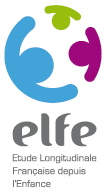French longitudinal study from birth: an unprecedented look at child learning in the first year of elementary school in France
Following the Spring 2016 survey of ELFE children in the penultimate year of preschool in over 4,000 schools across France, a new survey of the children at age 7 and in their first year of elementary school has been conducted from early April to June 2018. The aim was to collect information about what and how they learn.

At birth
Interview with child’s mother at the maternity hospital, biological samples, distribution of dust-collectors to test exposure to environmental pollution
Age 2 months
Telephone interview
Age 2-10 months
Questionnaires on feeding and diet
Age 1
Telephone interview
Age 2
Telephone interview, questionnaire for paediatrician
Age 3 and half
Telephone interview and home visit (games with the child, biological samples, recovering dust-collectors, count of child’s movements)
Age 5
In-school survey and internet games
Age 5 and a half
Telephone interview
Age 7
In-school survey
Survey in first year of elementary school
This survey has been conducted with 12,000 ELFE children in over 9,000 elementary schools. Teachers had children do exercises in mathematics (mental arithmetic, solving worded math problems) and French (word reading, oral and written comprehension); children answered questions that assess self-esteem.
Three non-ELFE children born at dates close to ELFE children’s also participated.
New and precious information on questions related to education
The survey conducted with children in the first year of elementary school will shed light on their transition from preschool to elementary school. Children’s verbal and numerical acquisitions as observed by their teachers will be analysed in connection with individual child’s health, pace of daily activities including sleep patterns, extra-curricular activities, classroom organization and activities, parents’ child-raising practices, use of books and screens in the home, relations with extended family and neighbours, child’s attitude and response to authority, etc. Certain information is likely to prove decisive, such as young children’s use of electronic screens and the impact thereof, and the particular needs of disabled or gifted children.
The data collected on ELFE children will enable researchers to account of the individual children’s living conditions, family structure, health and development when analysing these survey results.
Source: ELFE study website
Contact: Marie-Aline Charles
Online: April 2018

